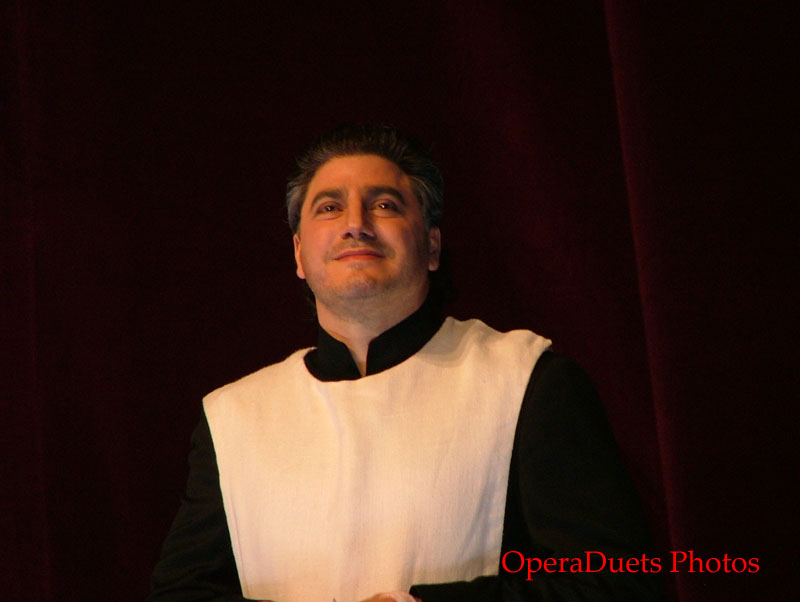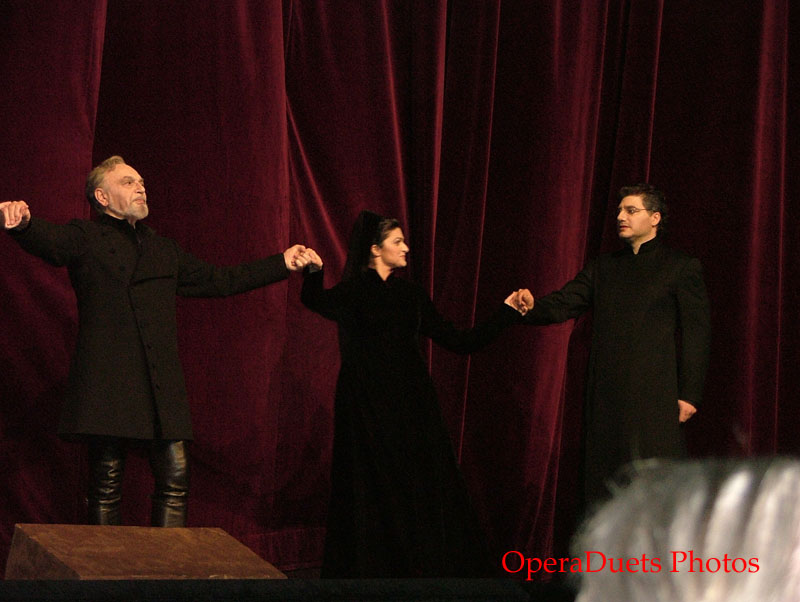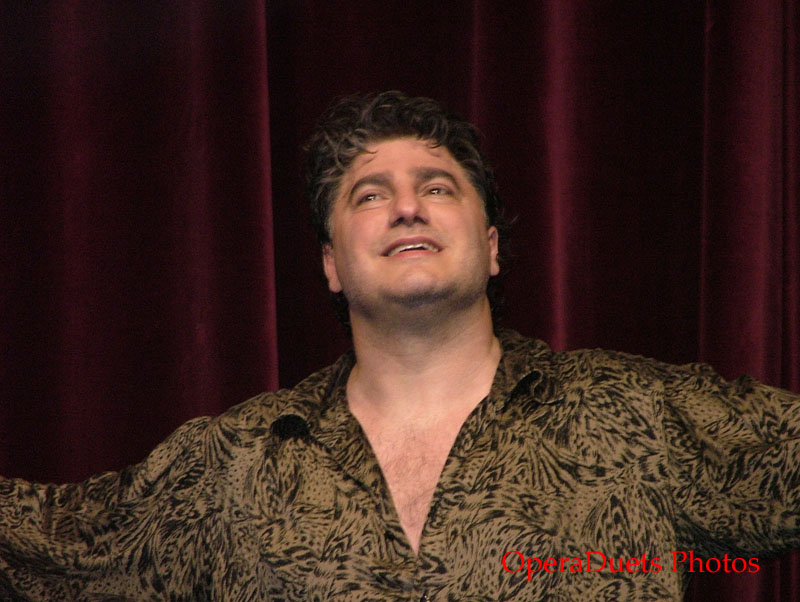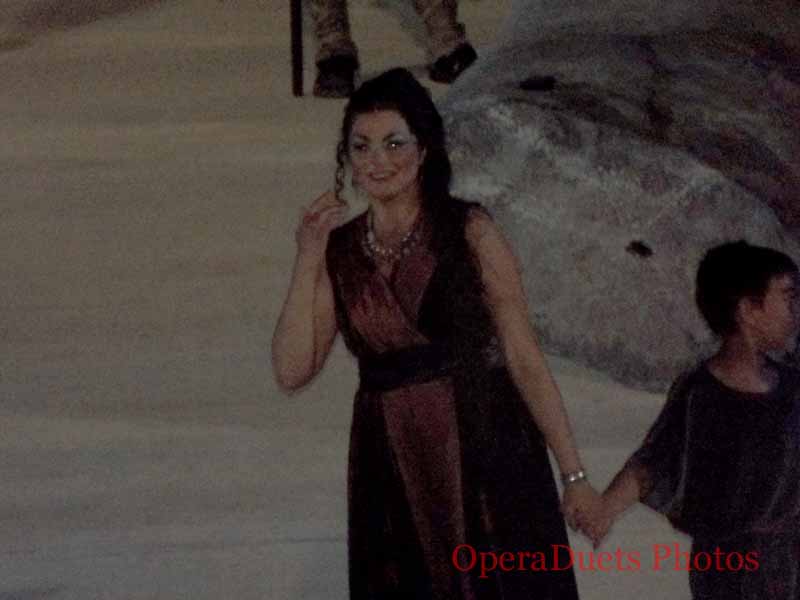2004-10-10 Buon Compleanno Maestro Verdi, Teatro Regio Parma
Sopranos:
Elena Borin, Adriana Damato, Tiziana Fabbricini, Alessandra Rezza,
Mezzo: Alessandra Canettieri
Tenors:
Valter Borin, Luca Casalin, José Cura, Zvetan Michailov
Baritones:
Leo Nucci, Vladimir Stoyanov
Basses:
Franco De Grandis, Federico Sacchi, Riccardo Zanellato
Renato Palumbo, conductor
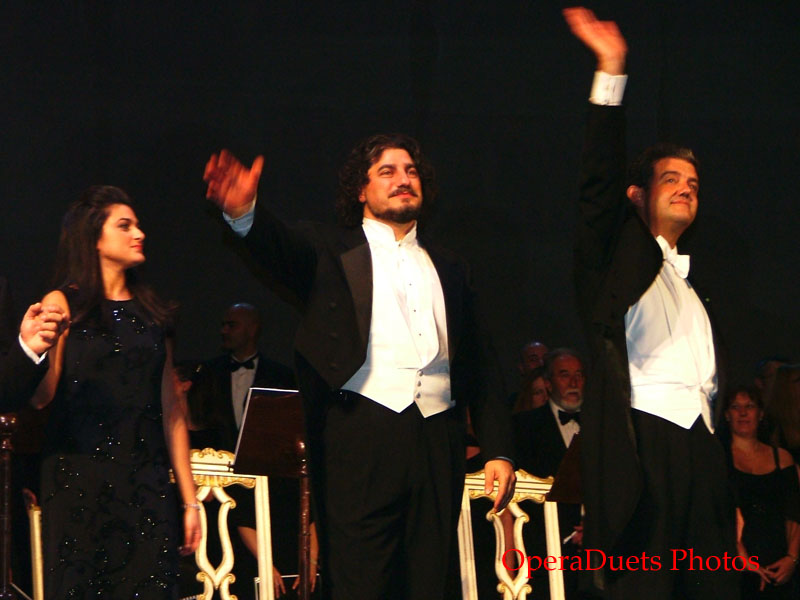
10 October 2004
Parma - Teatro Regio, 10 October 2004, at 20.30
excerpts from Giovanna d'Arco, Alzira, Attila, Macbeth,
I Masnadieri, Il Corsaro
Orchestra e Coro del Teatro Regio di Parma
Conductor Renato Palumbo
Regie Lorenzo Arruga
Actors Olga Gherardi, Giancarlo Giannini
Chorus Master Martino Faggiani
Audiovideo Dynamic s.r.l. DVD
Supported by Banca Popolare dell'Emilia Romagna
GIOVANNA D’ARCO
Tragic opera with a prologue and three acts on a libretto by Temistocle Solera, from Die Jungfrau von Orléans by Friedrich Schiller.
Première:
Milan, Scala Theatre, February 15th, 1845.
Sinfonia (ca. 7 minutes)
2 minutes: Olga Gherardi, Giancarlo Giannini
Prologo, Scena IV (6,5 minutes)
Oh ben s'addice questo... Sempre all’alba ed alla sera…
Giovanna - Adriana Damato, soprano
Adriana Damato sang this difficult opera aria with great passion. Her dark-hued voice has a very special appeal. She obviously knew this aria, she didn't need to use the notes. This aria is one that is hard to love at first hearing but then it is almost addictive. The passion, the early Verdi sound and this soprano voice was a perfect match.
1 minute: Olga Gherardi
Atto I, Scene III, IV (7,5 minutes)
Ho risolto… Dunque, o cruda, e gloria e trono... È puro l'aere - limpido il cielo
Giovanna - Adriana Damato, soprano
Carlo - Jose Cura, tenor
chorus
A tenor and soprano both with a dark hue in their voices. Passionate duet. Perfect together. The only thing that I missed during the whole concert was more acting and interacting, not just standing there and singing gloriously. Not a fault of Jose Cura. I simply loved È puro l'aere - limpido il cielo.
2,5 minutes: Olga Gherardi, Giancarlo Giannini
ALZIRA
opera with a prologue and two acts on a libretto by Salvatore Cammarano, from Alzire ou les Américains by Voltaire
Première: Naples, San Carlo Theatre, August 12th, 1845.
Atto I, Scena VIII (5 minutes)
Nella polve genuflesso…
Gusmano - Vladimir Stoyanov, baritone
Alvaro - Franco De Grandis, bass
Alzira - Tiziana Fabbricini, soprano
Zamoro - Valter Borin, tenor
Ataliba - Federico Sacchi, bass
Zuma - Alessandra Canettieri, mezzo
chorus
Great voices. Franco de Grandis fabulous, Vladimir Stoyanov glorious, Valter Borin wonderful beautiful tenor voice. And the ALZIRA, Tiziana Fabbricini very special soprano voice; the sound of her voice is edgy but it is warm when you come into center of the voice. She shines though this wonderful scene.
Atto I, Scena VIX (5 minutes)
Qual suon?...Che avvenne?... Trema, trema... a ritorti fra l'armi
Gusmano - Vladimir Stoyanov, baritone
Alvaro - Franco De Grandis, bass
Alzira - Tiziana Fabbricini, soprano
Zamoro - Valter Borin, tenor
Ataliba - Federico Sacchi, bass
Zuma - Alessandra Canettieri, mezzo
Ovando - Luca Casalin, tenor
chorus
The same great voices with Luca Casalin in the comprimario role of Ovando.
Atto II, Scena III (8 minutes)
Per chi? - Per me. S' ei muore, io moro...Il pianto, l’ambascia…
Atto II, Scena IV: Di pira non più, ma d'ara, e talamo
Alzira - Tiziana Fabbricini, soprano
Gusmano - Vladimir Stoyanov, baritone
Ovando - Luca Casalin, tenor
Wonderful duet, I think it is Tiziana making it so divine, wonderful. But of course, the baritone is good too. Her sound is just right for Alzira, especially in this duet
Atto II, Scena VI (7,5 minutes)
Miserandi avanzi… Irne lungi ancor dovrei... Non di codarde lagrime
Zamoro - Zvetan Michailov, tenor
Otumbo - Luca Casalin, tenor
chorus
Another tenor as Zamoro. Zvetan Michailov's tenor is darker than Borin's, more muscular. Irne lungi ancor dovrei... is a wonderful aria. After these excerpts I think that ALZIRA must be a wonderful opera, at least that the music is great.
2,5 minutes: Olga Gherardi, Giancarlo Giannini
ATTILA
Opera with a prologue and three acts on a libretto by Temistocle Solera, taken from Attila re degli Unni by Zacharias Werner.
Première: Venice, La Fenice Theatre, March 17th, 1846
Prologo, scena III (7,5 minutes)
Di vergini straniere…Allor che i forti corrono...Da te questo or m'é concesso
Odabella - Alessandra Rezza, soprano
Attila - Riccardo Zanellato, bass
Aldino - Luca Casalin, tenor
chorus
The great aria of Odabella is wonderfully sung by Alessandra Rezza. Allor che i forti corrono.... Great applause and BRAVA!!!
Prologo, scena III (8,5 minutes)
Uldino, a me dinanzi...
Prologo, scena IV: Attila!-Oh, il nobil messo!
Prologo, scena V
La destra porgimi. . . Tardo per gli anni, e tremulo…
Attila - Riccardo Zanellato, bass
Ezio - Leo Nucci, baritone
One of great joys of ATTILA is these wonderful duets. Riccardo Zanellato is great as Attila but it is Leo Nucci who is the man. Tardo per gli anni, e tremulo… is wonderfully sung. (Avrai tu l'universo, Resti l'Italia a me.)
Prologo, Scena VII (5 minutes)
Quai voci! Oh, tutto... Qui, qui sostiamo!… Ella in poter del Barbaro!
Foresto - Jose Cura, tenor
chorus
One of the highlights of the concert. Jose Cura is just marvelous as Foresto.
Ella in poter del Barbaro is just wonderful, never knew it was such a wonderful aria before I heard Jose Cura sing it!!!! BRAVO!!
Prologo, Scena VII (4 minutes)
Cessato alfine il turbine... Cara patria, già madre e reina
Foresto - Jose Cura, tenor
chorus
Jose Cura sang Cara patria, già madre e reina with his dark passion.
Atto II scena I (5 minutes)
Tregua è con gli Unni…Dagli Immortali vertici
Ezio - Leo Nucci, baritone
The other great man in this concert was Leo Nucci who was simply the greatest as Ezio. I saw Leo Nucci as Ezio in Zurich in 1998. He was wonderful. But in 2004 he is better than in 1998. BRAVO!!!!
Atto II scena II (5,5 minutes)
Chi vien?... Salute ad Ezio
Atto II scena III: Che brami tu?
Atto II scena IV: È gettata la mia sorte
Ezio - Leo Nucci, baritone
Foresto - Valter Borin, tenor
chorus
Another Foresto, good, but no Jose Cura. Leo Nucci È gettata la mia sorte. Grandissimo!!!
PAUSE ( 25 minutes)
2 minutes: Olga Gherardi, Giancarlo Giannini
MACBETH
Opera in four acts on a libretto by Francesco Maria Piave, from William Shakespeare's tragedy of the same name.
Première: Florence, Pergola Theatre, March 14th, 1847.
Atto I, Scena V (9,5 minutes)
Nel dì della vittoria…
Atto I, Scena VI: Al cader della sera il Re qui giunge
Atto I, Scena VII: Duncano sarà qui?...qui? qui la notte?...Vieni T’affretta!...
Lady Macbeth - Alessandra Rezza, soprano
un servo - Federico Sacchi, bass
Wonderful soprano voice. Passionate rendition of the aria, but I miss the ugly, dangerous sound when she sings "Duncano sarà qui?...qui? qui la notte?". It is too beautiful sung, that is true Lady Macbeth singing.
1 minute: Giancarlo Giannini
Atto I, scena XVI (8 minutes)
Di destarlo per tempo il Re m'impose
Atto I, scena XVII: Oh, qual orrenda notte!
Atto I, scena XVIII: Orrore! orrore! orrore!
Atto I, scena XIX: Schiudi, Inferno, …
Macbeth - Leo Nucci, baritone
Lady - Tiziana Fabbricini, soprano
Banquo - Riccardo Zanellato, bass
McDuff - Valter Borin, tenor
una dama - Elena Borin, soprano
First Macduff, then a short Banquo scene (beautiful singing by Riccardo Zanellato), then Macduff has found the old king dead, killed. Wonderful singing by the ensemble. Beautiful a-capella parts. Tiziana is a wonderful Lady with her Macbeth (Leo Nucci). Leo Nucci and Tiziana Fabbricini really enjoyed being the couple Macbeth.
0,5 minute: Olga Gherardi
Atto IV Scena V (6,5 minutes)
Perfidi…! Pietà rispetto, amore,…
Macbeth - Leo Nucci, baryon
Leo Nucci is fabulous in all scenes and arias. Only one small thing he sings "honore" when it is "amore", Pieta, rispetto, amore. Otherwise it is just stupendous.
Atto IV Scena VI: (8,5 minutes)
E' morta la Regina!
Atto IV Scena VII: Sire! ah, Sire!
Atto IV Scena VIII: Via le fronde, e mano all'armi!
Atto IV Scena IX: Carnefice de' figli miei, t'ho giunto.
Atto IV Scena X: Infausto giorno!
Atto IV Scena XI: Ove s'è fitto l'usurpator?... Salve, o re!
Macbeth - Leo Nucci, baryon
Malcolm - Luca Casalin, tenor
McDuff - Valter Borin, tenor
una dama - Elena Borin, soprano
chorus
Leo Nucci shines, great chorus. Unfortunately the orchestra has trouble in being together in Act IV scene IX, the announcement of Macduff coming is fuzzy, disorderly, embarrassing. But it comes together in the end.
3,5 minutes: Olga Gherardi, Giancarlo Giannini
I MASNADIERI
Opera in four acts on a libretto by Andrea Maffei, from the tragedy Die Räuber by Friedrich Schiller.
Première: London, Her Majesty's Theatre, July 22nd, 1847.
Parte I, scena III (10,5 minutes)
Vecchio! Spiccai da te… La sua lampada vitale…
Parte I, scena IV: Signor, che volete?
Parte I, scena V: Fra poco, Francesco, sarai qui signore!
Franceso - Leo Nucci, baritone
Armino - Luca Casalin, tenor
What can anyone say about Leo Nucci, he is a miracle...
Parte II, scena VI (6 minutes)
Come splendido e grande… Di ladroni attornato…
Parte II, scena VII: Capitano! noi siamo cerchiati. . .
Carlo - Zvetan Michailov, tenor
Rolla - Luca Casalin, tenor
chorus
Zvetan Michailov sings this aria wonderfully.
Parte III, scena II (7 minutes)
Qual mare, qual terra da me t'ha diviso?
Amalia - Adriana Damato, soprano
Carlo - Valter Borin, tenor
Wonderful duet, Valter Borin and Adriana Damato is just perfect together.
1,5 minutes: Olga Gherardi, Giancarlo Giannini
IL CORSARO
Tragic opera in three acts, on a libretto by Francesco Maria Piave, taken from The Corsair by George Byron.
Première: Trieste, Teatro Grande, October 25th, 1848.
Atto I scena II (6,5 minutes)
Tutto parea sorridere…
Atto I scena III: Della brezza col favore...
Corrado - Jose Cura, tenor
Giovanni - Federico Sacchi, bass
chorus
I have heard Jose Cura sing the aria "Tutto parea sorridere" before even more beautiful than here in Parma but is was wonderful with the chorus and Federico Sacchi as Giovanni, Corrado's second in command on his pirate ship.
Atto I scena IV (6 minutes)
Egli non riede ancora!...Non so le tetre immagini…
Medora - Adriana Damato, soprano
Adriana Damato sang this aria .... que possa dire... I loved it. Only one regret, how I would have loved to hear the Corrado/Medora duet from act 1 with Cura and Damato, or the Corrado/Gulnara duet from act 2 with Jose Cura and Adriana Damato. That would have been something to die for...
2,5 minutes: Olga Gherardi, Giancarlo Giannini
Atto II, scena X (14 minutes)
Si risparmi quell'uom
Corrado - Jose Cura, tenor
Gulnara - Alessandra Rezza, soprano
Seid - Vladimir Stoyanov, baritone
Giovanni - Federico Sacchi, bass
Selimo - Luca Casalin, tenor
How is it possible to be disappointed with this great wonderfully sung scene from Il Corsaro. It just so happens that I know that there is even more beautiful scenes in this opera that I would rather hear;
like
ATTO PRIMO
SCENA V
Medora e Corrado.
CORRADO
È pur mesto, o Medora, il canto tuo
ATTO TERZO
SCENA ULTIMA
Medora, Corrado e Gulnara con alcuni Corsari.
CORRADO E MEDORA:
Ah quest'amplesso è balsamo
But all is not lost I will see/hear the whole opera in Barcelona, February 2005
Happy Birthday, Maestro Verdi!!!
Most wonderful Verdi concert!!
Magic in Parma!!!!!!!!!!!!!
OD Travel + Photos
